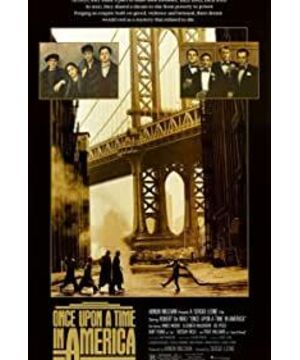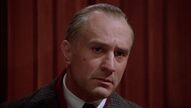The words sung in the opera at the beginning of the film: May God bless the United States.........has set the tone of sadness for the film. Then it briefly described the shooting of "Noodles" after calling the police 30 years ago and his embarrassed escape. Using the memories of "Noodles" in old age as a clue, he unfolded that period of American past...
It can be seen from "noodles" that he would rather go to the toilet than go home: his family conditions are not good. Adding to the selfish fraud of the police (confiscation of pocket watches, adultery of underage girls, and even mingling with the underworld) by the police who will appear later, we can see the misery of American society. It is precisely because of this that "noodles" did not receive an excellent education, but instead developed the habit of filthy language and stealing and robbery for a living. However, "noodles" also has the brilliance of human nature. His intentional truth even surpasses money, rights and life: in order to avenge his companions, he risked his life to kill the murderer. The naive "noodles" thought that "Mai Da" would also think so. After "Noodles" was released from prison, the performance of "Mai Da" really made people's eyes shine. Not only did he not embezzle the "provided fund", he shared the wealth of his years of hard work with noodles. As a result, "Noodles" has reverted to the old business, and started a dirty business with his companions (the bankruptcy robbed of no hesitation is a good example). However, Deborah could not be forgotten in his heart, and his reunion with Deborah prompted a change in his outlook on life. Her phrase "It's not that I don't love you, I want to be an actor, not to be with criminals like you" may be firmly engraved in the heart of "Noodles". At the same time, "Mai Da" they discovered his move, which is why the atmosphere in the house will be so depressing after the noodles came back. "Mai Da is angry with the noodles" is justified. The fact is just as Mai Da thought, the meeting with Deborah changed the noodles: 1 In the diamond transaction, after receiving the payment from the businessman "Joe", the "Mai Da" played black and black, which made "Mai Da". Falling into deep self-blame; 2 After saving the worker leaders, "Noodles" did not accept the opportunity to climb up through this relationship. These all reflect the awakening of the conscience of "noodles". In sharp contrast, "Mai Da"'s betrayal: using his wife to deceive "noodles" and killing his companion from birth to death, making him feel guilty for thirty years and unable to extricate himself. Even "robbed" the lover of "noodles"-Deborah. The dark society has turned the affectionate and righteous Mai Da into a beast of interest. Finally, "Mai Da" also jumped into the garbage truck in despair.
"To make a film, I will lose my five-year life." This film puts all the feelings and efforts of the director Leon, especially the clever transfer during the transition, making the reader feel that the memories and reality are integrated and confusing. , Not sure.
Details that are not easy to detect and understand:
1. When describing noodles in childhood, there are a lot of "sexual" behaviors. The director explained that the lack of children's sex education represented by noodles is also the lack of overall education.
2. When Noodles and Deborah go home after parting, readers will find that the atmosphere is very depressing, and Mai Da has a lot of opinions about the noodles and Deborah's meeting, and has tantrums with the woman. Some readers believe that it was because they were beaten and injured their lower body in childhood, and (in the movie) they lost their sexual function, and thus became jealous of the sexual relationship between noodles and Deborah. I think it should be understood as: Mai Da is worried that this will affect the noodles and affect their business. Because, in the subsequent diamond trading, Mai Da played black eating black, the noodle was very angry, and asked Mai Da why he didn't tell him. Mai Da said that he was afraid that the noodles would move compassion and hinder them from doing things. Noodles also admitted that if he knew, he would definitely stop them. This shows: 1. After contact with Deborah, the noodles are indeed deeply affected. 2. Through "Mai Da did not tell him in advance", it can also be seen that Mai Da is worried about his psychological changes. 3. There is no obstacle to the sexual function of Mai Da. Thirty years later, Noodles went to see Deborah. When he left, he saw Mai Da's son, and he was very similar to his childhood Mai Da. It can be seen that there is no obstacle to the sexual function of wheat.
3. The noodle raped Deborah, and readers may question whether the noodle loves Deborah. In fact, Noodles loves Deborah very much, otherwise she will not be sad because of her departure, let alone change because of her. In the car, Deborah took the initiative to kiss the noodles, but when the noodles wanted to have sex with him, Deborah would rather die. Description: Deborah loves noodles. But she said: "I want to be an actor, and I don't want to marry a criminal." So I can only hide love in my heart. As for noodles who raped her, it embodies the ambition of noodles to get what they want. After all, he lacked education in childhood and still had an ugly side.
4. The director's method of combining reality and fiction may confuse readers, and they don't understand how the noodles are young at the end. In fact, after Mai Da's suicide, all readers have seen are memories of noodles. First is the running carriage, which is the scene of people reveling after the "Prohibition" was promulgated. Later, in the memory, he returned to the opium shop and ended the film with a smile.
5. The old noodles went to Fatty Mo and saw in front of the TV that the union leaders who used to protect the interests of the lower classes had become corrupt politicians. The reader does not understand the director's intention. The materialistic old society has changed the innocent friendship between noodles and Mai Da, and it can naturally also change the people who have defended the interests of the people. The change of this leader satirizes society's corruption of people's hearts. When Noodles faced him chatting on the TV, he gave a sentence: "It's the bullshit again."
The truth in the movie is intriguing.
View more about Once Upon a Time in America reviews











